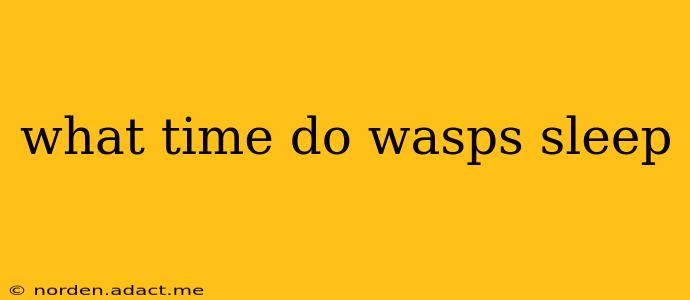Wasps, those buzzing insects often mistaken for bees, lead fascinating lives. Unlike humans with our rigid sleep schedules, wasps don't sleep in the same way we do. Understanding their rest patterns requires exploring their unique biology and behavior. This article dives deep into the world of wasp rest, answering common questions and dispelling myths surrounding their nocturnal activities.
Do Wasps Sleep at Night?
The short answer is: not in the same way mammals do. Wasps don't experience REM sleep or the deep, restorative sleep humans enjoy. Instead, they exhibit a state of inactivity, often referred to as quiescence or rest. This period of reduced activity usually occurs at night, but the duration and depth of this rest vary depending on several factors, including species, age, and environmental conditions.
What Do Wasps Do at Night?
Nocturnal behavior in wasps is largely dependent on their species and life stage. Some solitary wasps are active during the day and rest at night, often seeking shelter within their nests or other protected areas. Social wasps, like yellow jackets and hornets, might exhibit some level of nighttime activity, particularly if disturbed. However, the majority of their activity is concentrated during daylight hours. At night, they generally remain within their nests, exhibiting a state of reduced activity – a period of rest that's different from mammalian sleep.
How Long Do Wasps Rest?
The duration of a wasp's rest period isn't fixed. It's influenced by factors such as temperature, light levels, and the wasp's energy reserves. Cooler temperatures often lead to longer periods of inactivity. Similarly, wasps might rest longer after periods of intense activity, allowing them to conserve energy and prepare for the next day's foraging or nest-building activities.
Do Wasps Hibernate?
Some wasp species, particularly those in colder climates, exhibit a form of hibernation or diapause during the winter months. This is a state of dormancy characterized by significantly reduced metabolic activity and a suspension of development. However, this is distinct from their nightly rest periods. Diapause is a seasonal adaptation to survive harsh winter conditions.
What Happens if Wasps Are Disturbed at Night?
While generally inactive at night, wasps can still be roused. If disturbed, they might become defensive, especially if their nest is threatened. Therefore, it's best to avoid disturbing wasp nests at any time, day or night.
Are Wasps More Active at Certain Times of Day?
Wasp activity typically peaks during the warmest parts of the day, usually in the late morning and afternoon. This is when they're most active in foraging for food, building and maintaining their nests, and engaging in other essential activities.
What are the Differences Between Wasp and Bee Sleep?
While both wasps and bees are active during the day, the specifics of their rest periods differ. Like wasps, bees don't experience sleep as mammals do. Their rest periods are typically shorter and less consistent than those of some wasp species. Their activity levels are also influenced by environmental conditions, temperature, and their daily tasks.
In conclusion, while wasps don't sleep in the human sense, they do enter periods of inactivity, especially at night. Understanding these rest patterns sheds light on their fascinating adaptations and behaviors, highlighting the complexity of their seemingly simple lives. Remember always to approach wasps with caution and respect, giving them the space they need to thrive.
